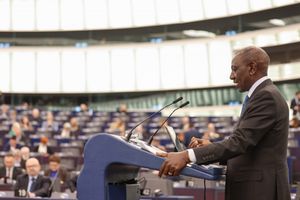
Chinese President Xi Jinping meets with Kenyan President William Ruto at the Great Hall of the People in Beijing, capital of China, on October 18, 2023. William Ruto was in Beijing for the third Belt and Road Forum for International Cooperation.
| AFPNews
Prime
Xi’s changing priorities slow Ruto's quest for transboundary SGR
Kenya is once again playing second fiddle to Ethiopia in the region’s relations with China, with Nairobi’s plan for a transboundary standard gauge railway (SGR) project, seen as crucial for trade with neighbour Uganda and the Great Lakes region, looking uncertain.
At the end of the 3rd Belt and Road Initiative (BRI) forum in Beijing this week, Nairobi’s pitch of its plan to extend the SGR to Congo-Kinshasa and Congo-Brazzaville through Uganda seemed to have failed to convince the Chinese to fund the project, as yet, with sources saying those neighbours did not buy into the project as envisioned by the Chinese.
And China’s changing priorities, including tightening the integrity of Chinese-funded projects as well as uncertainty around Uganda’s commitment to the project combined to hurt Kenya’s bid, for the second time in three years.
By press time, Kenyan officials were still hopeful of a breakthrough, indicating that the deal could indeed go through for a $6 billion funding of the line from Naivasha to Malaba and onward to Kampala.
On Wednesday, President William Ruto told his hosts in Beijing he had spoken with his peers and that all had agreed the SGR is needed, now.
“We want to connect the eastern coast of Africa to the western coast of Africa using the SGR,” he told a Kenya-China meeting organised by the Kenya Investment Authority, on the sidelines of the BRI forum.
“We have had conversations with the President of Uganda (Yoweri Museveni), with the President of DRC (Felix Tshisekedi), and Congo-Brazzaville (Denis Sassou Nguesso), and we have all agreed on the need to extend this important piece of infrastructure as a means of facilitating trade across our continent and making sure that companies like yourselves who set up in Kenya not only have access to the Kenyan market but also access to the east African market and the continental market.”
But Uganda insists that it wasn’t part of any joint search for funding from Beijing. Although Kampala signed a memorandum with Nairobi in July to extend the SGR from Naivasha, it has committed to Turkish firm Yapi Merkezi to build its bit.
Nairobi’s challenge in Beijing was to show Kampala would guarantee the railway for it to be viable to the Chinese and secure the money.
But Waiswa Bageya, Permanent Secretary in Uganda’s Ministry of Works and Transport, which is the supervising agency of the SGR project, told The East African that at the moment, Kampala “cannot move away from the MoU with Yapi Merkezi”, as it would be a breach of contract.
When Uganda and Kenya signed the MoU, they agreed to find financiers but also make it viable by taking the railway all the way to the DR Congo border and other countries on the Northern Corridor.
With the inking of a deal with Yapi, Uganda switched to a different financing model, which will see it borrow from risk-averse export credit agencies (ECAs) that have a standing relationship with and a buy-in into the contractor’s business portfolio and technical capacity to executive the turnkey project.
In a previous interview, SGR project coordinator Perez Wamburu told The East African that despite Uganda terminating a $2.2 billion Kampala-Malaba phase contract with China Harbour and Engineering Corporation (CHEC) as the contractor for Malaba-Kampala leg of the project, the Chinese firm still wanted to play a role on the financing side.
“They have indicated to us that they have other proposals for the project, like to come up with an export credit agency deal,” he said.
No deal yet
But neither CHEC nor any other Chinese firm has since tabled a formal offer to finance Uganda’s SGR, according to Mr Bageya.
“At the moment, we do not have any offer from China,” he said. “But we are in touch with our Kenya colleagues. What matters is to have seamless railway transport.”
China this week did pledge more money for the BRI. There will be money, however, to be tapped. The China Development Bank will establish ¥350 billion ($48 billion) Belt and Road financing window, while the Export-Import Bank of China will establish ¥350 billion ($48 billion).
The Silk Road Fund will add ¥80 billion ($80 billion) in funds BRI “in a commercial and market-oriented manner.”
But China’s Exim Bank had always tied any money to the award of the contract to the Chinese firm. Kampala says Yapi can bring on board any type of financiers but would prefer risk-averse export credit agencies.
As Kenya haggled for a deal with China, sources told The EastAfrican that European and Middle Eastern lenders have made contact with Uganda’s Ministry of Finance, but details of the offers tabled remain unknown.
Kenya’s second hurdle was self-inflicted.
President Ruto arrived in Beijing on the back of past criticism of China. He had vowed, during campaigns last year, that he would not take more debt, something he already violated.
The new debt, however, was obtained from Western multilateral lenders World Bank and International Monetary Fund, making his administration look West-oriented.
Some critics have accused him of running a foreign policy of survival.
Nasong’o Muliro, a foreign policy and security lecturer in Nairobi, says there is always a danger in non-strategic foreign policy.
“Foreign policy of survival can ruin our national interests,” the don argued, adding, “maybe he needed to apologise for his campaign statements.”
He said Kenya needs to keep China and Russia close because immediately the transactional US realises that Kenya is no longer a point of competition with China, Washington will abandon and shift the competition to Ethiopia.
In China, Dr Ruto upended the optics, however.
“We agreed on creating a conducive environment for Chinese companies that will undertake projects including road construction, railway expansion and airport modernisation,” he said after meeting Li Xi, a senior member of the Communist Party of China on Tuesday.
After a meeting with President Xi Jinping, they said they had categorised their relationship as the beginning of a new era of “Zheng He,” named after the 14th century Chinese sailor who arrived in Malindi.
But Ethiopia took all the shine. Prime Minister Abiy Ahmed and President Xi elevated their relations to “all-weather partnerships,” a category within the Belt and Road Initiative that signals priority in projects meant to boost trade and connectivity.
“Ethiopia has a rich history and a strategic geographical location that has long positioned it as a gateway between Africa, Asia and Europe,” Dr Abiy said. “The Belt and Road Initiative provides us with a unique opportunity to leverage this advantage and further strengthen our role as a regional hub for trade, investment, and connectivity.”
Ethiopia, which recently joined the BRICS, has lately become the biggest economy in eastern Africa, with a GDP of $156 billion, against Kenya’s $118 billion, according to the IMF.
“China is ready to step up bilateral cooperation under BRI and BRICS frameworks,” said Wu Peng, a senior Chinese diplomat, after Dr Abiy met with President Xi Jinping.
Experts think African countries like Kenya, and China both need the SGR, for different reasons. China wants to continue its trajectory of accessing Africa’s hinterlands. But it needs certainty that the projects it builds can pay the debt or at least bring benefits to Beijing.
Africans need it to reconnect, at a cheaper price.
“From a soft power diplomacy point of view, Dr Ruto’s slant on the BRI works to give the project international legitimacy as it enters its second decade in the Global South,” said David Monda, a professor of political science at the City University of New York.
“As an anchor state in East Africa, Kenya's enthusiasm for the BRI works well with China's efforts to expand its soft power influence in the Global South. It also helps China to drive a wedge between Kenya and its traditional multilateral lenders in the West, especially the US.”
In his speech, President Xi told the Forum that he wants to “build an open, inclusive and interconnected world for common development”.
But he said the focus now will be more on an open, green and clean cooperation.
“China will be promoting integrity-based Belt and Road cooperation,” he said.
Together with its cooperation partners, he said China will release the achievements and prospects of Belt and Road Integrity Building and the High-Level Principles on Belt and Road Integrity Building, and “establish the Integrity and Compliance Evaluation System for Companies Involved in Belt and Road Cooperation”.
Kenya’s initial SGR project from Mombasa to Nairobi was shrouded in scandals around procurement and land purchase, pushing the initial price higher than that of Addis-Djibouti SGR.
President Xi argued that there will be no loopholes even when projects involved international organisations this time.
For China, projects like the SGR aren’t about geopolitical rivalry.
“What we stand against are unilateral sanctions, economic coercion and decoupling and supply chain disruption,” President Xi argued.
A look at recent BRI trends shows African countries that look uncertain may be abandoned. For example, when Kenya initially looked reluctant to deal with Beijing, China signed Tanzania on to the BRI.
Geopolitics
Since 2017, when the first BRI forum was held, Kenya, Ethiopia and Egypt have been common guests. This time,Mozambique and Congo-Brazzaville joined in.
“This shows Beijing's strategic planning around the importance of African continental maritime, road and rail networks in North, East, South and Central Africa in the BRI network,” said Prof Monda.
“This is especially important to China with America's decoupling policy with regards to Chinese supply chain networks and America's strategic containment of China in Africa. The BRI is a fascinating example of global geopolitical competition not only in Africa, but on a global scale.”
Globally, however, China’s priority seems focused on immediate neighbours. President Xi said he will speed up a “high-quality development of the China-Europe Railway Express” and participate in the trans-Caspian international transportation corridor as well as “make joint efforts to build a new logistics corridor across the Eurasian continent.”
He said he will also establish pilot zones for Silk Road e-commerce cooperation, enter into free trade agreements and investment protection treaties with more countries.






